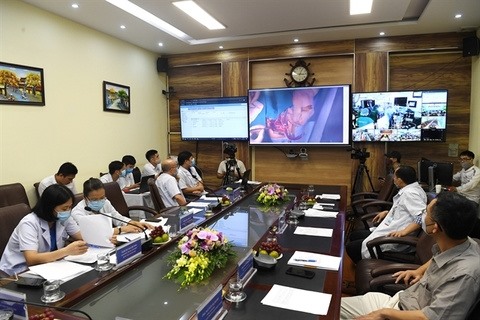.jfif) Opinion
Opinion

Nguyễn Sinh Hiền, Deputy Director of Hà Nội Heart Hospital, talks about the telehealth system, which was built to meet the remote examination and treatment system standards of the Ministry of Health.

|
Doctors implemented the first online heart surgery in Việt Nam. — Photo courtesy of Viettel Solutions
Nguyễn Sinh Hiền, Deputy Director of Hà Nội Heart Hospital, talks about the telehealth system, which was built to meet the remote examination and treatment system standards of the Ministry of Health. By integrating modern image transmission technology and connecting Internet of Things with high-speed transmission, the system is capable of real-time processing, ensuring accuracy for surgeries from far away. Doctors at higher-level hospitals can directly operate lower level surgeries, helping shorten the process of treating patients in emergencies
How did you become a surgeon?
It was not a simple process, actually, it was very arduous. When I was a trainee doctor in Việt Nam and France, I did everything from treating patients to nursing duties. I do not refuse anything. In 1997, I started to help with heart surgeries.
In France, I assisted doctors in daily operations. In such an environment, I learned a lot from their experience to improve my skills. Gradually, I was allowed to perform some main techniques.
In particular, doctors also changed my perception and attitude towards the profession. Being a doctor is a job, our duty is to serve the people and save people. That is not a “blessing” to the patient. That helps me to always do my best with the job.
What was your first surgery as the main surgeon like?
In 2004, for the first time, I stood in the operating room as the main surgeon. It was just a pretty simple ventricular septal defect surgery. After 15 years of formal training, seven years of being an assistant, at that time, I got used to the job, so I no longer felt nervous.
Since then, my most complex cardiovascular surgery techniques have been performed at Hà Nội Heart Hospital.
At that time, was there no other option for teachers to pass on experience and knowledge to the next generation except for on-the-job experience?
Not only at that time, until recently, we still had to maintain on-the-job training. The doctors at grassroots levels had to go to hospitals in central cities or provinces to learn, or vice versa, the specialists had to go to their places to train.
For example, recently doctors at Phú Thọ Province’s General Hospital successfully performed surgery to patch the ventricular septum of a 55-month-old child in a weak physical condition. For this to be possible, we worked together for the past four years. At first, they went to Hà Nội to learn. After that, we went down to the site to show them.
With the development of information technology, medical students and surgeons have found their jobs done in a much easier way. What do you think about this?
Right! When I was a medical student, I didn't have a mobile phone, no internet. There were not so many cardiovascular surgeons, either. So besides a few professors, my teachers were books and patients. After each surgery, I learned from my own experience.
Nowadays, the development of information technology is of great help to medical students and doctors. If you are not sure what the problem is, you can easily search on Google.
Recently, doctors at Phú Thọ Provincial General Hospital successfully operated a "distance" heart surgery for the first time. This event will probably prove that in the near future, we can expect that through telehealth, more doctors will be able to shorten their study time, can't we?
Telehealth is a revolution in the medical industry. Therefore, I believe this is an opportunity to shorten the learning time of the surgeon specialising in cardiology. Currently, many trainee doctors after only 2-3 years can confidently become the main surgeon.
We used to have only one way to impart knowledge to the next generation, which was "hands-on", then instruction via mobile phone. Today, when using telehealth, we can communicate with each other through real images and real sounds. The ideas and content to be conveyed are instant, geographical distance is no longer a problem.
How will this change the surgery sector?
For doctors of grassroots levels, telehealth offers three benefits. First, they don't have to travel to hospitals at central level for training.
Second, they can perform surgery confidently. For a successful surgery, it depends largely on the mindset of the doctor, not their hands. Thus, counselling plays a very important role in the success of the surgery. The remote support of experts will help doctors at the grassroots level feel secure in holding knives, minimising dangerous events. In particular, if doctors at grassroots levels are unlucky and have complications, telehealth will help to get timely treatment instructions, directly from upper-level doctors, which could save the patient's life in a narrow margin.
Third, during the current outbreak of COVID-19, the application of telehealth will ensure the safety of doctors. Because they don't have to move between many different medical facilities.
This is the first step, for further counselling and support activities in a chain of remote examination and treatment activities. We expect remote examination and treatment consultancy activities on the information technology platform will increasingly promote efficiency and ensure sustainability in the transfer of technologies for lower levels. VNS